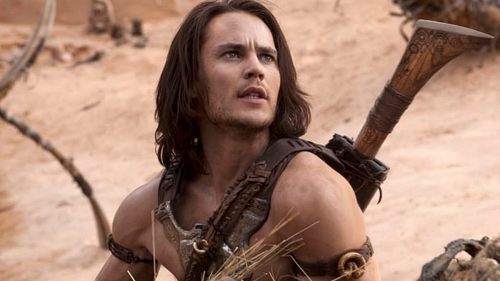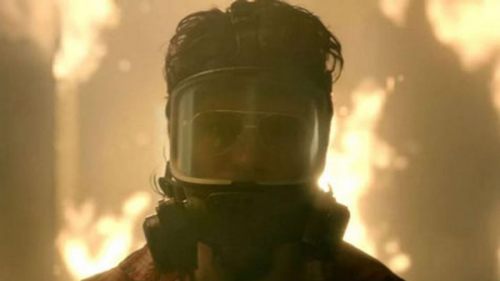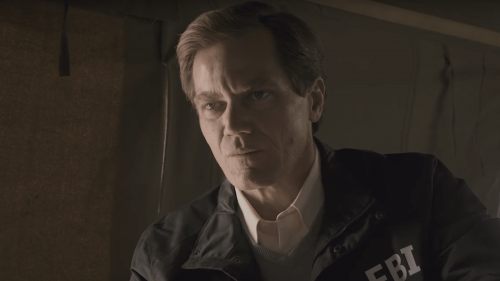Dylan O’Brien And Taylor Kitsch Talk AMERICAN ASSASSIN And Modern Action Movies
American Assassin is the latest entry into the action boom that’s taken over genre cinema. An introduction to Vince Flynn’s counterterrorist operative with an axe to grind, Mitch Rapp (Dylan O’Brien), Assassin could be the first entry in a new franchise looking to fill the void where Tom Clancy’s ace boy scout, Jack Ryan, used to be. His foil is the mysterious “Ghost” (Taylor Kitsch), who was trained by the same violent guru (Michael Keaton) who taught Rapp how to hunt. Michael Cuesta’s picture is a dad rock greatest hits compilation, where three familiar archetypes show down to the death.
We were lucky enough to sit down with Dylan and Taylor, where they talked about training for the film, and how they were careful when tackling terrorism within genre cinema trappings…
Birth.Movies.Death: Thanks for taking time out here with us.
Taylor Kitsch: No problem. Austin is home. You guys are home. I’ve had so many great memories here. Dylan have you watched a movie at an Alamo?
Dylan O’Brien: Nah.
TK: It’s amazing. Grab a beer immediately. [laughs] They bring it to you at your seat.
DO: Shit. That’s awesome.
TK: This is the first time they’ve hosted a screening of a movie I’ve been in, though. So I gotta give ‘em some shit for that.
BMD: So, American Assassin is part of this new resurgence in the action genre. What do you think people are responding to that’s allowed action movies to come back in such a big way?
TK: I don’t think we ever sign on in terms of just what genre we’re working in, but I know that this film is very “grounded”. That’s a big part of what I think audiences are gonna get out of this movie. No offense to John Wick, but the gun work in that movie…it’s almost surreal at times. It’s crazy.
But that’s part of the pulpy appeal to John Wick. That’s not to say we’re not making pulp, but [American Assassin] is probably a bit less “escapist” than something like John Wick.
DO: These are very real world topics we’re dealing with in Assassin, but we’re doing so in a way that’s entertaining. But there’s a bunch of training that goes into our motions and movements in the shoot out sequences. We trained a bunch with two and three gun experts to get our characters down just right. Plus, we’ve built this very personal story inside the narrative, where we meet Mitch, and we get to know what drives him. It’s an intimate relationship, too, between Mitch and Stan Hurley (Michael Keaton).
TK: That’s a huge part of what makes this movie work so well. There’s this triangle between me, you, and Keaton’s character that really creates this tension that you can feel in the whole film.
BMD: Now, you call the movie “grounded”, and the author (Vince Flynn) prided himself in the level of detail he’d bring to these stories. How did you both work to bring that authenticity to the project?
TK: Working with the guys who actually do this stuff. We had a special operative [note: who both actors referred to as “Yost”] who we worked with the whole time while we were filming, and who was making sure every move we made felt real.
DO: He’s the real hero in this movie. We would’ve never been able to do this without him. It was a real priority for us to honor this community of individuals who do engage with this type of counterterrorist activity in the real world. Sometimes, the only way the public has to engage with these guys and what they do is through film, so it’s our job to bring the details of their profession to the screen as accurately as possible. Even if its something as simple as how you walk into a room, we wanted to get that right.
TK: I remember, I had to work a couple days with one of the consultants who, you know, obviously wanted to get on screen with me. But they’re not the best at understanding that every single movement you make has to look a certain way or else the reality of what you’re trying to create is going to be lost. It looked so bad, though, that I’d go to [director, Michael] Cuesta and say, “hey, we gotta work on this”, and he’d send Yost over to give a quick five-minute primer on how to even grab a gun. [laughs] Because we wanted it to be real, but he was doing it so badly that it was taking me completely out of the scene!
DO: There’s a piece of the movie that we completely designed after Yost – it’s a moment that occurs at this local gun range where [Mitch Rapp] is putting himself through this kind of personalized training – where I cross the line and take my gun and start firing at all the targets, to really try and make a point of how serious I was regarding my mission. That was all Yost. He designed that scene.
BMD: So, how was it working with Michael Keaton?
DO: Who?
TK: Terrible. That guy is just so full of himself. [laughs] No, his involvement was what got me to sign on, to be blunt. I have a great admiration for the man…
DO: Oh, it wasn’t to work with me?
TK: No. All Keaton. But seriously, I was doing Only the Brave with [producer] Lorenzo di Bonaventura, and he came over and told me Dylan was on board, and we got Michael Keaton, and there were some other key crew members, but that’s all I really needed to hear.
BMD: But what about Dylan? His feelings seem hurt here.
TK: He was alright, I guess.
DO: That’s fair.
TK: No, it’s broad strokes for me to discuss – but one of the main reasons I gravitated toward this whole idea was the notion of an American citizen planning an attack on his own country, and the relationship “Ghost” has with both Dylan and Keaton’s characters. But with “Ghost” not being in the book, I got to create him from the ground up, and a lot of that honestly came from being able to work with both these guys, and it was just really incredible. I loved doing that.
DO: And there’s no bad guys in this movie. Nothing is done without reason. Once you learn the background of “Ghost”, and why he’s attempting to perpetrate the attack on America, you actually understand and sympathize with him as much as you do Mitch.
TK: The trauma that “Ghost” goes through mirrors what Dylan’s character goes through. But then you have Keaton in the middle; dealing with both of these men and the pain they endure that really creates this intimacy.
BMD: Now, I want to be sensitive when asking this question: but making a movie about terrorism, and especially an American committing an attack against his own country, were you ever really sensitive about that storyline?
DO: Yeah, absolutely. It was our first concern. A lot went into the decision as to what we were making. Terrorism is always going to be a very sensitive topic to fictionalize. But American Assassin doesn’t have an agenda. It’s not trying to make a grand statement or take a side in the war against terrorism. Yet we are still trying to convey a level of “grounded” understanding regarding its real world consequences. We’re commenting, but it’s not the focus of the film. In the end, it’s about relationships.
BMD: Do you hope for Mitch Rapp to get his own franchise? Did you even approach it with that mindset?
DO: Well, it’s like sixteen books or whatever. So, there’s definitely a potential…
BMD: Also the potential for you to be replaced by Ben Affleck in the future.
DO: If I’m lucky. Old Ben Affleck and play Old Mitch Rapp.
American Assassin is currently playing in theaters. Get your tickets here.



